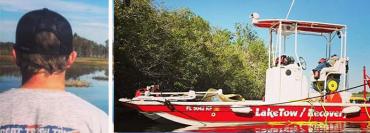
There are safety consequences to lowering the lake. The folks who know Lake Okeechobee best, who work on it and fish in it, keep telling us a deliberately lowered 10.5-foot lake is an accident waiting to happen.
On Saturday night, we found out how justified those fears were when three boys visiting from South Carolina and fishing in Lake Okeechobee, ran aground about a mile from shore.
It was about 7:30 p.m. Getting dark and scary. The boys, age 15, 15 and 12, remained in the gathering dark and finally pitch black for more than three hours, calling for help, shining a single, barely visible light toward land. Fortunately, at about 11 p.m., the boys were rescued unharmed with only a damaged boat hull.
"We saw firsthand how the (U.S. Army Corps of Engineers') aggressive push to lower the lake has already begun impacting boaters and, unfortunately, put this group of teenagers' lives at risk," said Ramon Iglesias, co-founder of Anglers for Lake Okeechobee.
"This was not a crisis determined by Mother Nature," he said. "It was an unnecessary, man-made crisis that could have been avoided."

What most disturbed anglers about Saturday night is, Lake Okeechobee was at 11.3 feet when the boys ran aground. Said Iglesias, "The consequences of a 10.5-foot lake would be unimaginable."
Iglesias called Bill Matchekowsky who works on the lake rescue boat, Lake/Tow Recovery.
"These boys shouldn't have been out there at all," said Matchekowsky, who told Sunshine State News he averages about 50 rescues a year. "They were underage, there were no markers in those waters. But that's what we see now, mostly tourists from out of state who haven't made a float plan, haven't communicated with anybody. They're usually running too fast. And some of them don't even know how to use a GPS," he said.

"Right now, except for tourists, the lake is very quiet. Floridians know what's going on and they're staying off it," explained Matchekowsky, who has "worked the lake" for nearly three decades. "A low lake means business is bad for a lot of people."
Iglesias said, despite the low lake level, the recent Roland Martin Marine Series tournament went ahead anyway. It drew 254 anglers (down from 330 in 2918). Iglesias and the tournament organizers knew where to direct them and how to keep them safe. Out-of-town anglers are less familiar with the lake, thus less predictable.
"We've had experience with the dangers and difficulties of low water," Matchekowsky said. "The 2011 drought endangered boaters and put people out of business." (See the notice above, posted in Clewiston in 2011, during what then was a naturally occurring period of low water.)
Reach Nancy Smith at nsmith@sunshinestatenews.com or at 228-282-2423. Twitter: @NancyLBSmith.


